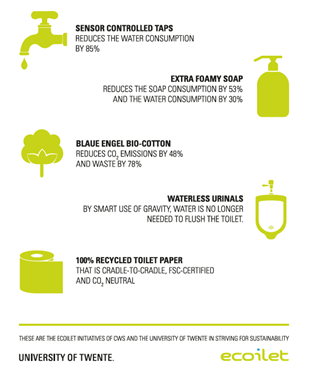Sustainability within the cleaning services at UT can be found in several ways.
Most commonly, this concerns the use of bin liners, paper, etc. But there is so much more than that. Below, you can find an overview of the agreements entered into between Asito, CWS and the Facility Service Centre in terms of sustainability.
- Social sustainability
Human sustainability is a primary focal point to which UT wishes to make a bigger contribution. In the coming years, this will transform into a statutory obligation.
Social Return
At least 5% of Asito's employees at UT are people who have difficulty on the labour market, such as long-term unemployed people and young people receiving 'Wajong' benefits. Asito entered into a covenant with Workplein Twente. Every quarter, all vacancies to be expected for cleaners are placed there. Through a speed dating process, Asito selects candidates who are subsequently asked for a follow-up interview. After further introductions, candidates are offered training positions. This entails a trial position for two months in which all aspects of the work are covered. After successful completion, the candidates will move on to the regular vacancies as much as possible. UT also acts as a training site.
Illiteracy
Employees who are limited in their day-to-day functioning because they are unable to read and write can receive training to learn this from Asito.
Ambassadors
Asito's cleaning team has sustainability ambassadors who have been asked to provide input on structural points for improvement. They see so many different locations at UT, which allows them to see a lot and thus makes them ideal people to provide advice. They will constantly be looking for improvements together with the Facility Service Centre.
- Means and materials
From cradle-to-cradle toilet paper to recyclable dispensers. You usually do not stop and think about all the things that are being used already.
Asito element
Asito Element is a new, innovative and very environmentally-friendly cleaning agent that is used. It is made 100% of natural materials, which means no hazardous substances are left after use. This, in turn, results in better maintenance of finish materials in our buildings. Asito Element achieves the biggest savings in terms of environmental burden by making the use of descaling and sanitation cleaning agents unnecessary.
Ecotoilet
The products and means used in all the sanitation facilities ensure that these rooms meet the ecoilet concept. This sustainable sanitary concept has the following benefits with respect to traditional toilet rooms:
- Up to 48% less CO² emission
- Up to 79% less waste by using certified bio-cotton
- Up to 53% less soap use thanks to foam
- 100% recycled, FSC certified, cradle-to-cradle and CO² neutral produced toilet paper
 The toilet paper and paper hand towels are made from exclusively white waste paper. The toilet paper dispenser has a brake mechanism that results in about 20% less toilet paper used.
The toilet paper and paper hand towels are made from exclusively white waste paper. The toilet paper dispenser has a brake mechanism that results in about 20% less toilet paper used.The barrier mats are washed with the water that has been used for the towel rolls. The mats are then pressed to remove as much water as possible, are dry faster as a result, which in turn results in less gas use for the dryers.
The towel rolls used are made from organic cotton. This is free from synthetic fertilizers, toxins and do not contain any pesticides that are difficult to break down. It is grown without genetically modified seeds.
Micro-fibre method
Micro-fibre cloths have a special structure thanks to which the dirt immediately clings to the cloth and no cleaning agents are required. Only a minimum amount of water is required because the dirt and grease cling to the cloth instead of solve in water. This results in a clear savings on water and cleaning agents.
Equipment
The energy-efficient models of machines and equipment are used as much as possible. Even if it means that machines will need to be replaced prior to the usual depreciation period. In this case, they are given a sustainable second life at locations where they will be used less often. The various dispensers are made from synthetic materials with some metal parts. At least 90% of this can be recycled.
Waste and transport reduction
Sustainability is not only taken into account at UT itself. Sustainability requirements have also been set for Asito's and CWS' locations and for transport to UT. Reduction of their own waste and reduction of the scope and amount of transport flows is a constant point of attention for both parties.
Responsibility
Contract management: CFM Facility Services (via General Servicedesk)
Operational management: Facility Service Team Leader
Operational execution: Asito & CWS